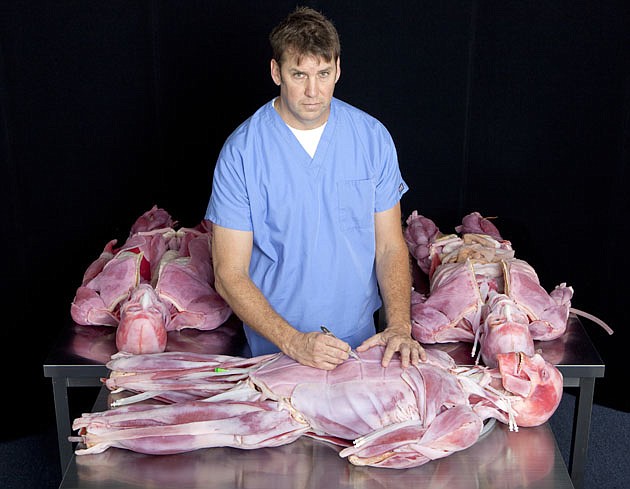- November 26, 2024
-
-
Loading

Loading

Stepping into SynDaver Labs is a jarring experience. Non-human parts floating in jars adorn shelves and employees walk about in scrubs covered in substances that could be with confused with human blood.
The freaky scene proves SynDaver's President and Chief Technology Officer Christopher Sakezles succeeds in his aim to produce life-like cadavers for a myriad of research purposes.
Indeed, Sakezles isn't a mad scientist bent on re-creating the human form for evil purposes. His firm recently broke into the university system, providing practice bodies for campuses such as Harvard, Columbia and Stanford — posh company considering he moved the firm's headquarters in 2009 from Sarasota to Tampa to get closer to USF (See Business Review Oct. 31, 2007).
The firm was once known as Animal Replacement Technologies and specialized in providing synthetic tissue and human parts for Fortune 500 companies to test medical products. In 2008, Sakezles changed his company's name to SynDaver Labs to reflect the move from tissue to total body.
In the past, Fortune 500 companies, like Johnson & Johnson, would order a piece of tissue, or at most, a faux limb on which to test its products. “The tissue is made primarily of water — like us,” Sakezles says. And as a researcher at heart, Sakezles earned a Ph.D. in polymer science from the University of Florida, he is excited to bring his product to academia.
Sakezles was lured to the university life because he saw an opportunity for new business. The first step was to get geographically close to a university, so SynDaver moved to Tampa in 2009.
But the firm's artificial cadavers, which cost roughly $40,000, proved so popular they reached campuses across the U.S. Sakezles says his firm started pushing its faux-flesh creations at trade shows for this purpose in fall 2010.
SynDaver still receives a majority of its business from medical firms, roughly 70%. But the remainder streams from sales to universities and the military, which is new for the company.
Sakezles' synthetic bodies are a fresh fixture for military medics, as well. The company previously supplied tissue for ballistic testing, but now the firm's offerings help military medics train for battlefield situations.
“Any experienced medic will tell you they've been pretty pissed off with what they had to train with,” Sakezles says. He compares the products his competitors offer to Barbie dolls, saying they aren't composed of the life-like tissue of SynDaver's products. “The fact that they expect someone to put an IV in this thing is absurd,” he says.
And the company is doing what it takes to maintain its position in the industry. “We're filing patents on specific aspects (of the technology),” Sakezles says.
Although Sakezles will not disclose sales figures, he says the company is doubling revenues every nine months. SynDaver currently employs just more than 30.
“Odd as that seems, it's just the beginning for us,” Sakezles says.
The firm offers models of premature babies and fetuses as well as obese adults, says Sakezles. And he has big plans for the evolution of his synthetic man.
The mannequins SynDaver manufactures already have the ability to dilate their pupils, but Sakezles anticipates uncanny strides for his technology, such as using living cells in his creation. Says Sakezles: “We've gone from tissues to body parts to synthetic people.”